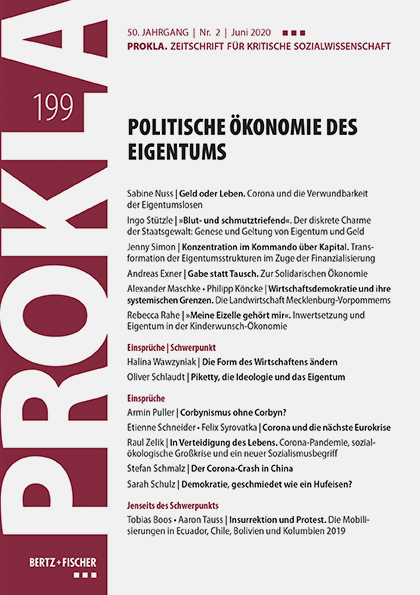Corona and the next eurozone crisis
Dangers and opportunities for the left
DOI:
https://doi.org/10.32387/prokla.v50i199.1873Keywords:
Eurozone crisis, Corona-Pandemic, European IntegrationAbstract
The coronavirus pandemic is developing into a global economic crisis. We argue that this might trigger a new eurozone crisis as the Eurozone is even more fragile today than in 2009: While in Southern Europe, the euro crisis has never been entirely overcome, the institutional reform of the architecture of the monetary union to make it more crisis-proof has been politically blocked in the past years. Moreover, the coronavirus crisis so far has hit Italy particularly hard, the country which had been the point of condensation of the contradictions of uneven development in Europe already before the corona pandemic. Against this background, the article concludes by discussing dangers and opportunities that progressive actors are facing in light of a potential second eurozone crisis
Downloads
References
Bayer, Kurt (2020): EU-Wirtschaftspolitik in Zeiten der Coronakrise. Wien.
BDI (2019): Mini-Wachstum im dritten Quartal 2019. Quartalsbericht Deutschland. Berlin.
Becker, Joachim u.a. (2015): Uneven and dependent development in Europe: The crisis and its implications. In: Jäger, Johannes/Springler, Elisabeth (Hg.): Asymmetric Crisis in Eu-rope and Possible Futures. London: 81–97.
BMF (2017): Non-paper for paving the way towards a Stability Union. Brüssel.
Brand, Ulrich/Högelsberger, Heinz (2020): Klimapolitik nach Corona. URL: apps.derstandard.at. Zugriff: 27.3.2020.
Demirovi?, Alex (2020): In der Krise die Weichen stellen. Die Corona-Pandemie und die Per-spektiven der Transformation. URL: zeitschrift-luxemburg.de.
Deutsche Bundesbank (2020): Kurzbericht Konjunkturlage. In: Monatsbericht der Deutschen Bundesbank 72(3): 5–15.
ECB (2020): ECB Data Warehouse. Frankfurt/Main.
FAS (23.3.2020). Bernau, Patrick/Kremer, Dennis„„Wir könnten noch viel mehr tun“. Isabel Schnabel im Interview“. Frankfurt/Main: 29. URL: faz.net
Foundational Economy Collective (2020): What comes after the Pandemic? A Ten-Point Platform for Foundational Renewal. Manchester.
Guntrum, Simon (2019a): Frankreichs Widersacher, Deutschlands „bad cop“? In: PROKLA. Zeitschrift für kritische Sozialwissenschaft 49(194): 163–170. DOI: https://doi.org/10.32387/prokla.v49i194.1773.
— (2019b): Zurück in der Spur: Die europäische Finanzmarktintegration von der Krise bis zur Kapitalmarktunion. In: Bieling, Hans-Jürgen/Guntrum, Simon (Hg.): Neue Segel, alter Kurs? Die Eurokrise und ihre Folgen für das europäische Wirtschaftsregieren. Wiesbaden: 139–174. DOI: https://doi.org/10.1007/978-3-658-25037-9_6.
Gutschker, Thomas (2020): Risikoanalyse der EU: Brüssel lehnt Grenzkontrollen wegen Coronavirus ab. URL: faz.net. Zugriff: 25.3.2020.
Handelsblatt (23.3.2020). Koch, Moritz u.a.„„Wir halten längere Zeit durch“. Interview mit Peter Altmaier“. Düssdeldorf: 8–9. URL: handelsblatt.com.
Holman, Otto (2004): Asymmetrical regulation and multidimensional governance in the Eu-ropean Union 1. In: Review of International Political Economy 11(4): 714–735. DOI: https://doi.org/10.1080/0969229042000279775.
IWF (2020): World Economic Outlook Database. Washington DC.
Lapavistas, Costas (2020): This Crisis Has Exposed the Absurdities of Neoliberalism. That Doesn’t Mean It’ll Destroy It. URL: jacobinmag.com
Liu, Quan u.a. (2014): Major emerging and re-emerging zoonoses in China: a matter of global health and socioeconomic development for 1.3 billion. In: International Journal of Infec-tious Diseases : IJID : Official Publication of the International Society for Infectious Dis-eases 25: 65–72. DOI: https://doi.org/10.1016/j.ijid.2014.04.003.
Matthes, Jürgen / Demary, Markus (2020): Hilfsinstrumente gegen die Corona-Krise im Ver-gleich. IW-Kurzbericht 33/2020. Köln.
Neumann, Mario/Pichl, Maximilian (2020): Die Welt nach Corona wird jetzt ausgehandelt. URL: freitag.de.
NZZ (9.5.2017). Rasch, Michael„Dritthöchste Überbewertung der letzten 130 Jahre“. URL: nzz.ch.
Pröbstl, Julian (2020): ESM-Kredite statt Corona-Bonds. URL: verfassungsblog.de. Zugriff: 27.3.2020.
Ryner, Magnus/Cafruny, Alan W. (2017): The European Union and Global Capitalism. Ori-gins, Development, Crisis. London.
Sablowski, Thomas u.a. (2018): Zehn Jahre Krise. Regulation des Lohnverhältnisses und un-gleiche Entwicklung in der Europäischen Union. In: PROKLA. Zeitschrift für kritische So-zialwissenschaft 48(3): 357 - 380. DOI: https://doi.org/10.32387/prokla.v48i192.893.
Schneider, Etienne/Mittendrein, Lisa (2017): Strategischer Ungehorsam statt Reform-Austritt-Dilemma. In: Entzauberte Union. Warum die EU nicht zu retten und ein Austritt keine Lö-sung ist. Wien: 208–218.
Schneider, Etienne/Syrovatka, Felix (2019): Die Europäische Wirtschaftsunion zwischen Ver-tiefung und Desintegration. Blockade und wachsende Asymmetrie zwischen Deutschland und Frankreich. In: Bieling, Hans-Jürgen/Guntrum, Simon (Hg.): Neue Segel, alter Kurs? Die Eurokrise und ihre Folgen für das europäische Wirtschaftsregieren. Wiesbaden: 21–59. DOI: https://doi.org/10.1007/978-3-658-25037-9_2.
Shah, Sonia (2020): The microbes, the animals and us. URL: mondediplo.com. Zugriff: 28.3.2020.
Theobald, Thomas; Tober, Silke; Lojak, Benjamin (2017): IMK Finanzmarktstabilitätsreport 2016. Regulatorischen Fortschritt weiterentwickeln. Düssdeldorf (IMK Report, 121).
Downloads
Published
Versions
- 2020-06-02 (2)
- 2020-04-16 (1)






